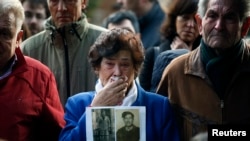The recently approved Democratic Memory Law, popularly known as the “Grandchildren’s Law”, will allow thousands of Latin Americans to apply for Spanish nationality without the condition of having lived in the Iberian country.
Through the new legislation, those who were born outside of Spain and have originally Spanish grandparents or parents may apply for nationality. In most cases, the beneficiaries will be descendants of Spaniards who fled Spain due to the Civil War and the violence that took place during the dictatorship of Francisco Franco. Experts calculate that almost 500,000 Spaniards decided to go into exile. Although France was the main receiving country, Latin American nations such as Mexico, Argentina and Venezuela also welcomed a large number of Spanish families who forcibly left their homes.
They may also request it “the sons and daughters, born abroad, of Spanish women who lost their nationality by marrying foreigners before 1978”, when the Constitution came into force, and the “sons or daughters of legal age of Spanish citizens who their nationality of origin was recognized by virtue of the right of option” as indicated in the government statement.
It is not yet known when the “Grandchildren’s Law” will come into force, but it is expected to be published in the Official State Gazette (BOE) in the coming days, and subsequently ratified by King Felipe VI. Later, the Consulates of Spain around the world will inform the applicants about the steps to carry out the process, which will have a period of two years.
Until now, some of the requirements to acquire Spanish nationality consisted of having a Spanish father or mother who had been born in Spain, having lived in the country for ten years legally and continuously, or presenting a letter by nature.
After months of debate, the Senate definitively approved the Democratic Memory Law last Wednesday with 128 votes in favor, 113 against and 18 abstentions.
According to the statement from the Palacio de la Moncloa, it is legislation that “is based on the principles of truth, justice, reparation and guarantee of non-repetition, expressly vindicates the Transition and the defense of democratic values, and condemns for the first time the military coup of July 1936 and the Franco dictatorship”.
In this way, the current law, baptized as the “Historical Memory Law” and approved in 2007 during the government of José Luis Rodríguez Zapatero, is repealed.
The “Law of Democratic Memory” also declares the illegality of the Francoist courts and their sentences, and gives the green light to investigate possible human rights violations of the civil war and the Franco dictatorship until the promulgation of the Constitution of 1978.
Connect with the Voice of America! Subscribe to our channel Youtubeand turn on notifications, or follow us on social media: Facebook, Twitter and Instagram.



![[Img #74675]](https://thelatestnews.world/wp-content/uploads/2024/12/They-discover-a-new-class-of-X-ray-sources-in-the-150x150.jpg)












